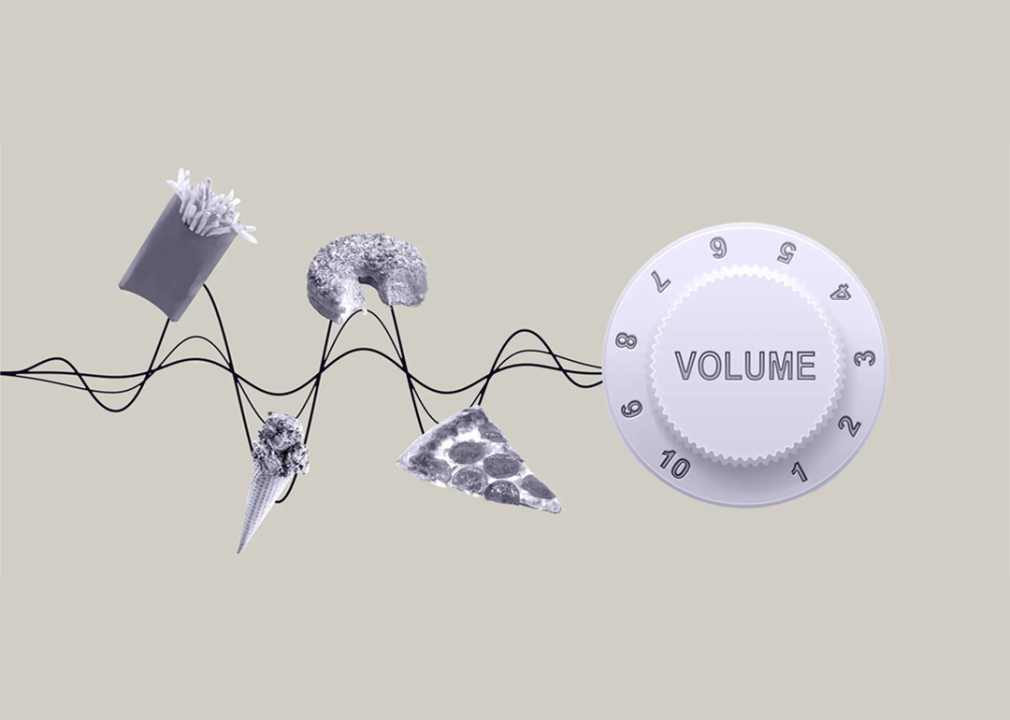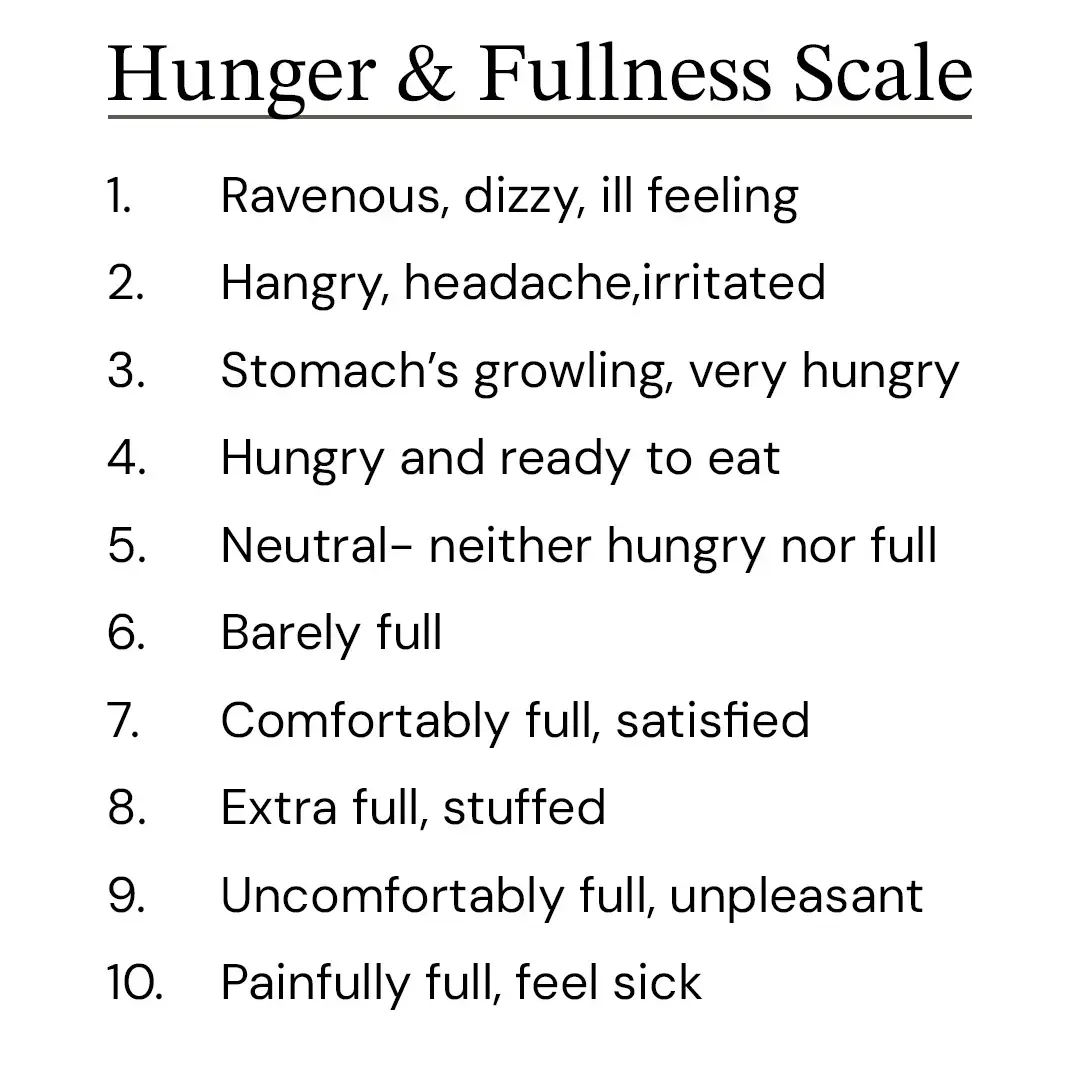Can weight loss meds silence food noise?

Illustration by Hone Health, images via Getty images // Adobe Stock // 500px
Can weight loss meds silence food noise?
Illustration of concept of food noise depicted by volume dial and food items on beige background.
Eat when you’re hungry, stop when you’re full. Simple, right? Advice like this is why “normal” people think using willpower and making smarter food choices is all you need to do to lose weight. But, if you’re always thinking about food to the point that it influences most of your daily decisions, you can’t trust your hunger cues to help you shed pounds.
Constant inner chatter about food and eating—so called “food noise”—is one of many obstacles for people trying to lose weight. “I can’t stop thinking about the pizza from last night. How much longer until lunch? If I skip the bread now, I can have fries later. This food noise can make losing weight feel impossible.” Is there a way to turn down the volume?
Many people taking weight loss meds say they hear less food chatter.
In her March 2024 primetime special, “Shame, Blame and the Weight Loss Revolution,” Oprah Winfrey opened up about her experience with one of the new GLP-1 weight loss drugs. “I’m not constantly thinking about what the next meal is going to be,” she said.
Hone Health talked to experts about how weight loss medications might help turn down the dial on food noise, plus, other non-drug tactics that help people shed pounds.
What is food noise?
Food noise refers to constant and persistent thoughts about food and eating. These thoughts are intrusive and difficult to suppress, making it feel as though your entire life revolves around food. In fact, some people taking anti-obesity medications like Ozempic or phentermine say they can go all day without a single thought about food, which is a drastic change from their usual line of thinking. “Is this how normal people think?” one Reddit user asks on a food noise thread in a weight loss medication group.
Food noise is “very powerful,” says board-certified internal medicine physician Lydia Alexander, M.D., Obesity Medicine Association president. She explains that it’s a stress response linked to food scarcity genes.
For tens of thousands of years, human survival depended on a strong desire to seek food and eat what was available. Any time you see, hear or smell food, your brain sends out a signal that you need to eat, even when you’re not hungry. Humans are also genetically programmed to prefer highly palatable, calorie-dense foods that fuel survival. That’s why people crave foods like pizza, French fries and ice cream.
Unfortunately, with food no longer scarce in most developed countries and a plethora of food images served up on social media constantly triggering hunger cues, those age-old instincts are now driving an epidemic of obesity. A recent review suggests the food scarcity genes that once helped humans survive are now contributing to health issues like obesity, heart disease, and Type 2 diabetes.
Not everyone reacts to food the same way, and many factors besides internal cues (such as a drop in blood sugar) influence the amount of food noise a person hears, including genetics, weight, hormones, food preferences and time of day. Lena Bakovic, a registered dietitian at Top Nutrition Coaching, explains that people who experience higher levels of food noise may have a harder time registering hunger and fullness cues, which may lead to overeating.
How weight loss meds silence food noise
Anti-obesity medications silence food noise by enhancing satiety, says Alexander. You feel less hungry, so you’re not constantly obsessing about food.
Semaglutide, the active ingredient in Ozempic and Wegovy, is a glucagon-like peptide-1 (GLP-1) receptor, while tirzepatide, the active ingredient in Mounjaro and Zepbound, is a glucose-dependent insulinotropic polypeptide (GIP) receptor and GLP-1 receptor agonist. Both medications mimic hormones that regulate appetite and food intake. Though it’s not clear how these medications silence food noise, it’s theorized that they may interact with areas of the brain that regulate appetite, eating behaviors and pleasure-seeking behaviors. Prescription appetite suppressants also promote satiety, which can dampen food noise.
By decreasing hunger and increasing satiety, anti-obesity medications give you an opportunity to create healthy habits, such as going for walks after dinner and setting your bedtime an hour earlier, that work to “extinguish the behaviors that increase food noise,” explains Alexander.
However, if you’re thinking about asking your doctor for weight loss meds, know this: Medications are only one piece of the weight loss puzzle, even if they do quiet the constant chatter. They’re most effective when used as part of a comprehensive weight loss program that addresses the underlying cause of weight struggles.
Are some weight loss meds better for silencing food noise than others?
Studies show that semaglutide and tirzepatide are better at promoting weight loss than other anti-obesity medications. But they’re not the only prescription medications that help with weight loss.
Contrave is an anti-obesity medication that combines an opioid receptor antagonist with an antidepressant. It supports weight loss by promoting satiety, reducing food intake and enhancing energy expenditure.
Qsymia is another anti-obesity medication. It’s made up of the appetite suppressant phentermine and the anti-seizure medication topiramate. Together, these medications make you less hungry and feel full, so you eat less.
Do weight loss meds always silence food noise?
Anti-obesity medications don’t always silence food noise, says Alexander. Obesity is a complex and multifactorial disease, and no single treatment works for everyone. If one medication fails to lead to significant results, it’s okay to try another, she adds.
Weight management is the goal of all obesity treatment plans. Anti-obesity medications support that goal by helping people build behaviors—including learning how to plan healthy meals and eating more mindfully—that lessen or silence food noise.
But they don’t work in a vacuum, says Alexander.
What happens to food noise when you come off weight loss meds?
Obesity is a chronic disease, and medications can be part of long-term treatment. But if you plan to come off weight loss medication, you’ll need the right strategies and support to help you continue to experience the benefits. If you don’t address the underlying behaviors that trigger food noise, it will come back, warns Alexander. And keep in mind, food noise isn’t the only factor in weight regain after discontinuing medication.
Exercise, nutrition, stress management and sleep are all part of a comprehensive weight management plan aimed at long-term results. Building healthy routines makes you feel good and supports overall well-being, so you’re less likely to turn to food to fill an emotional void, reducing constant thoughts of eating.
Bakovic, who provides nutritional coaching for people taking anti-obesity medications, says, a registered dietitian nutritionist can help provide the support needed to quiet food noise. Nutrition support instills healthy habits while you’re on anti-obesity medication, so if you do decide to discontinue the drugs, you’ve already established a better routine for long-term weight management.
How do you stop thinking about food all the time?
“One of the most important things individuals can do to help quiet food noise is to begin incorporating practices of mindful and intuitive eating, which in turn aids in the learning and awareness of hunger and fullness cues,” explains Bakovic.
Intuitive eating teaches you how to tune into physical and emotional hunger, break free from the “diet” mentality, and make peace with food. Intuitive eating encourages you to select foods you like to eat and that support your health. It’s not about eating perfectly all the time, but about teaching your body to crave the nutritious food it needs.
Shifting your weight loss mindset can also help stop constant thoughts of food, as can prioritizing nutrients that keep you full. Protein is the most satiating nutrient, and eating a high-protein diet has been shown to be more satiating and support weight loss. Fiber also reduces hunger and prolongs satiety by slowing down digestion and stimulating the release of satiating hormones like GLP-1. Creating meals that center around healthy sources of protein like chicken, fish or beans, and foods rich in fiber like whole grains and vegetables, may help subdue the obsessive thoughts.
Both Bakovic and Alexander also encourage their clients to improve stress management and sleep habits, because overwhelming stress and lack of sleep can increase hunger and trigger cravings for energy-dense foods that lead to weight gain.
A lack of healthy emotional outlets can also increase food noise, Alexander explains. If you use food as a way to cope with stress, uncomfortable emotions and boredom, and you don’t find other ways to manage the distress, the chatter won’t stop. It’s a vicious cycle that ties emotions to eating. Using other tools to cope with your emotions turns the vicious cycle into a virtuous one. Meditating, walking and socializing are non-food coping mechanisms that help take the focus off food to lessen the noise.
![]()

Hone Health
When to tune into food noise
Graphic listing “hunger fullness scale”.
Food noise isn’t all bad. There’s a clear distinction between physical hunger and other types of food noise, such as emotional hunger or cravings. As you get physically hungry, you start to think about food more. This can be categorized as food noise, but it’s normal and healthy. Physical hunger can be used as a tool that lets you know it’s time to feed your body.
Bakovic encourages clients to listen to their internal chatter to learn how to recognize hunger and fullness cues. She uses a hunger and fullness scale to teach her clients how to listen thoughtfully to these cues. The hunger scale is a tool that teaches you to eat when you’re mildly hungry or starting to think about food (level 4) and to stop eating when pleasantly full (level 7).
Listening to your hunger cues may stop restrictions and delays in eating that can lead to overeating. However, it takes practice, so give yourself time to get it right. Working with a registered dietitian who specializes in intuitive eating can help you learn its basic principles, address your nutritional needs and overcome challenges.
The bottom line
Constant thoughts about food can sabotage even the most well-intentioned weight loss efforts. Anti-obesity drugs are one of many tools that can help, quieting the noise so you can concentrate on making behavior changes—such as intuitive eating, reducing stress and getting enough sleep—that contribute to long-term weight loss and maintenance results.
This story was produced by Hone Health and reviewed and distributed by Stacker Media.